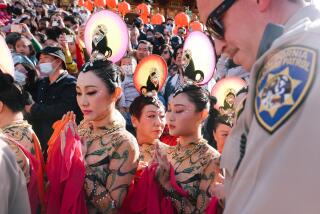In Tibet, ‘Happy New Year’ is not a wish; it’s an order
- Share via
BEIJING — The Chinese government has a New Year’s greeting for Tibetans: Celebrate, or else.
The Tibetan New Year, or Losar, is normally the most festive holiday of the year, when Tibetans burn incense, make special dumplings and set off fireworks. But this year, Tibetans have declared a moratorium on celebrating their own holiday, saying they will instead observe a mourning period for people killed last year during protests against Chinese rule.
The 15-day holiday begins Wednesday, and as it approaches, tensions are rising. In the last few weeks, the Chinese government has closed large swaths of western China to foreign visitors -- not just Tibet itself, but parts of provinces with large Tibetan populations.
Nearly a year after the violent demonstrations reportedly left more than 120 dead, Tibetans are trying a novel technique for nonviolent protest. “Say No to Losar,” as the campaign is called, was launched by Tibetan groups in Dharamsala, India, the Dalai Lama’s home in exile.
“Instead of the usual celebrations marked by singing, dancing and other festivities, silence will be observed and butter lamps will be lit in the temples and homes to pray for the deceased,” they announced in a statement last month.
The tactic appears to be driving Chinese authorities crazy. They’re countering with their own campaign of forced merriment, organizing concerts, pageants, fireworks, horse races, archery competitions. They’ve declared a one-week public holiday beginning today in Tibet and are offering free admission to museums and parks.
The Communist Party in Tibet also gave vouchers worth $120 each to 37,000 low-income families to shop for the holidays.
To further tempt the 2.8 million Tibetans, state television will broadcast a four-hour gala with 800 performers Tuesday night.
“They want to show that the Tibetan people are happy, that they have returned to normal life. But by intervening, they’re making them unhappy,” said Tsering Shayka, a Tibetan historian now living in Canada. “They are trying to come up with gimmicks instead of solving the problem.”
Robert Barnett, a Tibet expert at Columbia University in New York, says that Chinese efforts to push New Year’s celebrations are likely to backfire.
“I think people will ask, ‘Why is the Communist Party telling me what to do in my own home?’ ” Barnett said.
At Beijing’s Central University for Nationalities, Tibetan students who had applied last year for permission to hold a Losar celebration informed the university recently that they wished to cancel. But the university told them that the party must go on, said a university source who asked not to be quoted by name.
“Celebrating is compulsory,” he said.
As the holiday nears, tensions are spilling into the open.
On Feb. 14, a 39-year-old Tibetan monk set off a furor when he walked through a public market in the Tibetan plateau’s Lithang county carrying a photograph of the Dalai Lama and chanting, “No Losar.” Hundreds of people reportedly joined the protests, which continued into the next two days, according to the Dharamsala-based Tibetan Center for Human Rights and Democracy. The group said that Chinese police detained 21 people, some of whom were badly beaten, and that the county has been locked down for the holiday.
Reports say that as many as 20,000 additional soldiers and paramilitary troops have been deployed in Tibetan areas and that in Qinghai province, village leaders were threatened with arrest if they urged people not to celebrate the holiday.
Even among Tibetans, there is a vigorous debate about the campaign to boycott Losar. The holiday, which dates back to pre-Buddhist times, is the most beloved in the Tibetan calendar and involves elaborate rituals and meals. Families traditionally make a soup with special dumplings in which they hide various items -- chile pepper, wool, charcoal -- and family members read their fortune by which dumpling they pick.
“The very idea that there won’t be any Losar is, let’s admit it, a little bit like calling off Christmas in a Christian community,” one Tibetan blogger complained.
In addition to the tension over the holiday, next month will bring the 50-year anniversary of a failed anti-Chinese uprising, after which the Dalai Lama fled to India. The date has traditionally been a trigger for protests within Tibet, and this year might be especially tense because the Chinese plan to mark the occasion with a celebration of what they are calling “Serf Emancipation Day.” The Chinese government says it liberated the Tibetans from brutal feudal serfdom.
In a preemptive strike against another flare-up of violence, the Chinese have held thousands of Tibetans at a detention center east of Lhasa, according to bloggers in the Tibetan capital.
The Chinese also have launched a crackdown in Tibetan regions on out-of-town visitors without residency permits. Foreign tourists have been banned until at least April, people in the tourist industry said.
“It is going to be a very sensitive time. When the Tibetan New Year is finished, then it will be the one-year anniversary of the riots,” said a Tibetan tour guide who asked not to be quoted by name.
He said foreigners would not be sold plane or train tickets if they tried to get into Tibetan areas. “You can’t get in if they don’t want you in.”
--
Nicole Liu and Eliot Gao of The Times’ Beijing Bureau contributed to this report.
More to Read
Sign up for Essential California
The most important California stories and recommendations in your inbox every morning.
You may occasionally receive promotional content from the Los Angeles Times.













